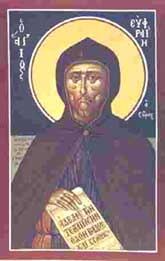Readings:
Job 38: 1-11
Psalm 68:11-18
Ephesians 3:8-12
Mark 9:38-41Preface of a Saint (1)
[Common of an Arist, Writer, or Composer]
[Common of a Thelogian and Teacher]
[For Artists and Writers]
PRAYER (traditional language)
Pour out upon us, O Lord, that same Spirit by which thy deacon Ephrem declared the mysteries of faith in sacred song, that, with gladden hearts, we too might proclaim the riches of thy glory; through Jesus Christ our Lord, who liveth and reigneth with thee and the Holy Ghost, one God, now and for ever. Amen.
PRAYER (contemporary language)
Pour out upon us, O Lord, that same Spirit by which your deacon Ephrem declared the mysteries of faith in sacred song; that, with gladden hearts, we too might proclaim the riches of your glory; through Jesus Christ our Lord, who lives and reigns with you and the Holy Spirit, one God, now and for ever. Amen.
Lessons revised in Lesser Feasts & Fasts 2024.
Return to Lectionary Home Page
Webmaster: Charles Wohlers
Lgast updated: 12 April 2025
EPHREM OF NISIBIS
DEACON AND HYMN-WRITER (10 JUNE 373)
 Ephrem
(or Ephren or Ephraim or Ephrain) of Edessa [or Nisibis] was a teacher, poet, orator,
and defender of the Faith. (To English-speakers, the most familiar form
of his name will be "Ephraim." It is the name of the younger son of Joseph,
son of Jacob (see Genesis 41:52), and is thus the name of one of the largest
of the twelve tribes of Israel.) Edessa (now Urfa), a city in modern Turkey
about 100 kilometers from Antioch (now Antakya), was a an early center
for the spread of Christian teaching in the East. It is said that in 325
he accompanied his bishop, James of Nisibis, to the Council of Nicea.
Certainly his writings are an eloquent defense of the Nicene faith in
the Deity of Jesus Christ. He countered the Gnostics' practice of
spreading their message through popular songs by composing Christian songs
and hymns of his own, with great effect. He is known to the Syrian
church as "the harp of the Holy Spirit."
Ephrem
(or Ephren or Ephraim or Ephrain) of Edessa [or Nisibis] was a teacher, poet, orator,
and defender of the Faith. (To English-speakers, the most familiar form
of his name will be "Ephraim." It is the name of the younger son of Joseph,
son of Jacob (see Genesis 41:52), and is thus the name of one of the largest
of the twelve tribes of Israel.) Edessa (now Urfa), a city in modern Turkey
about 100 kilometers from Antioch (now Antakya), was a an early center
for the spread of Christian teaching in the East. It is said that in 325
he accompanied his bishop, James of Nisibis, to the Council of Nicea.
Certainly his writings are an eloquent defense of the Nicene faith in
the Deity of Jesus Christ. He countered the Gnostics' practice of
spreading their message through popular songs by composing Christian songs
and hymns of his own, with great effect. He is known to the Syrian
church as "the harp of the Holy Spirit."
Ephrem retired to a cave outside Edessa, where he lived in great simplicity and devoted himself to writing. He frequently went into the city to preach. During a famine in 372-3 he worked distributing food to the hungry, and organizing a sort of ambulance service for the sick. He worked long hours at this, and became exhausted and sick, and so died.
Of his writings there remain 72 hymns, commentaries on the Old and New Testaments, and numerous sermons.
Several hymns are available at:
http://www.voskrese.info/spl/XefremSyria.html
Among Orthodox he is best known for a fasting prayer:
THE PRAYER OF ST EPHRAIM THE SYRIAN
O Lord and Master of my life, do not give me
the spirit of laziness, meddling, self-importance and idle talk. (prostration)
Instead, grace me, Your servant, with the
spirit of modesty, humility, patience, and love. (prostration)
Indeed, my Lord and King, grant that I may
see my own faults, and not condemn my brothers and sisters, for You are
blessed unto ages of ages. Amen. (prostration)
(Twelve deep bows, saying each time:
O God, be gracious to me, a sinner.)
[Translation by Fr James Silver, Drew University;
posted on the Orthodox list]
[text of two hymns omitted]